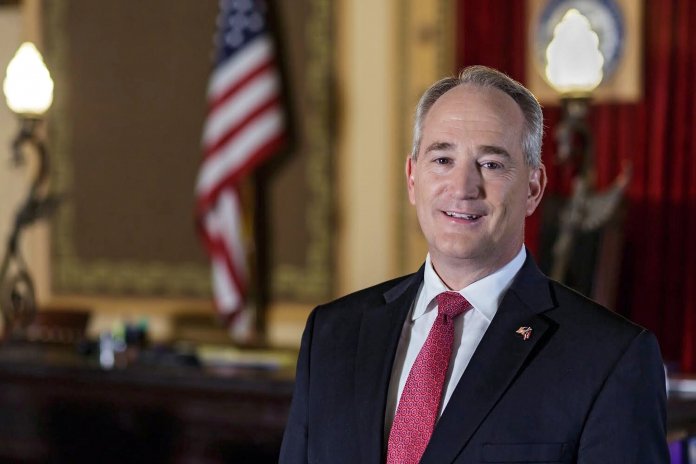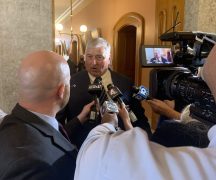Ohio Capital Journal
The Ohio Auditor of State declined to reveal any findings of his probe into Ohio’s coronavirus data, despite touting the ongoing audit at recent political events.
In July, state Auditor Keith Faber, a Republican, announced his plan to “examine case numbers of COVID-19.” This came amid festering rumors on social media of health departments inflating case counts — claims amplified in Ohio by an erroneous Fox Newsreport and parroted by the then-Ohio House Speaker.
The audit, at least in part, is driven by an online survey seeking respondents who may have received “test results that were later reversed” or who received “results for tests the individual did not take.” The survey requires primary documentation to support the claims.
Faber declined a public records request for available survey data and supporting documentation, citing a “working papers” exemption that shields accountants from releasing records used in an audit.
“It is important that Ohioans have confidence in the data used for making COVID-19 policies,” Faber said in an August statement. “There are widespread concerns and reports regarding false data. I saw a need for us to verify the data being used to either identify data errors or debunk what may, in some cases, be urban legends.”
Allie Dumski, a Faber spokeswoman, declined requests for preliminary data and did not respond when asked whether anyone involved in the audit has a public health background. She said to expect the audit sometime this winter.
“If there were any alarming findings, we would work with ODH to address the issue immediately for the benefit of public health,” she said.
While tight-lipped to media, Faber has touted the audit at two political events: a campaign rally for President Donald Trump in Swanton and his own personal fundraiser in the Cleveland area.
When Trump — who has called the virus a “hoax” hyped up by Democrats to damage him politically — came to Swanton for a Sept. 21 rally, Faber reportedly told a crowd (to cheers) that he’s auditing the Ohio Department of Health’s coronavirus
At an Aug. 5 fundraiser, Faber told attendees he has verified five cases of erroneous COVID-19 test results in his first week of looking.
John Plecnik, a Republican state committeeman who was in attendance said in an interview that Faber specifically asked those in attendance to share information about the five erroneous test results on social media. Plecnik heeded the request. His post was shared 1,600 times on Facebook.
Errors in testing are possible, given more than 3 million Ohioans have received an RT-PCR tested for a virus that did not exist a year ago. More than 145,000 of those tests yielded positive results.
Those figures only refer to people who have taken RT-PCR tests, the most trustworthy testing mechanism that works by amplifying viral RNA to detect an infection.
They do not include test results for antigen tests — which look for specific viral proteins in people who might currently be infected — or antibody tests, which look for antibodies in the blood of people who may have had COVID-19 in the past.
People who receive positive antibody or antigen tests, who officials deem symptomatic of COVID-19 or have a known exposure to an infected person, are counted as “probable cases.” This covers fewer than 9,000 cases (about 6% of Ohio’s known caseload).
ODH spokeswoman Melanie Amato said the department is aware of one instance in which a person received a letter stating he or she was positive, even though this person had not yet been tested.
The Mercer County Health District issued a news release in late July explaining the error.
“We have also asked Auditor Faber’s office to share any information regarding such complaints and have not received anything from them to date,” Amato said.
Gov. Mike DeWine took an antigen test that came back positive prior to an August Trump visit. Subsequent negative RT-PCR tests showed the antigen test produced a false positive.
The false positive fueled rumors of inflated coronavirus data.
Stoking those rumors, however, are a train of Republican lawmakers who use their social media platforms or traditional media profile to sow doubt, without evidence, in ODH’s numbers.
For instance, state Sen. Tim Schaffer, R-Lancaster, introduced a bill to allow health districts to opt out of ODH orders. He said he and his constituents are concerned about ODH publishing “fake data” about COVID-19.
State Rep. Nino Vitale, R-Urbana, runs a personal Facebook page that is its own engine of COVID-19 untruths: recent posts claiming the existence of “FEMA concentration camps,” the inefficacy of masks, and the greater likelihood of being struck by lightning than dying from COVID-19. These posts, while untrue, get shared thousands of times, reaching countless eyeballs with bunk public health information during a pandemic.
The Ohio House passed a “Truth in COVID-19 Statistics” bill introduced by Rep. Diane Grendell. The bill, which stalled in the Senate, would require by law ODH to produce information that’s generally already available on its website like test data, hospitalizations, outbreaks in congregate settings like prisons and nursing homes, and others.
Dumski characterized the audit as a pure follow-the-facts mission.
“We share your belief that ‘the public should know if there’s any problem at scale with ODH’s coronavirus data,’ which is why we are doing the audit,” she said. “The point of the portal is to debunk rumors or confirm the accuracy of the data presented by ODH. The Ohio Performance Team working with ODH to conduct the audit is comprised of data professionals with a wide variety of backgrounds.”
***
Power company says utility commission has no power to investigate its role in bailout scandal
An Akron-based utility company that figures prominently in a massive nuclear bailout scandal is saying that state regulators don’t have the authority to investigate whether the company improperly financed the bailout effort.
Over the past week, FirstEnergy Corp. has filed two documents with the Public Utilities Commission of Ohio saying that the commission and the state’s consumer representative don’t have standing to investigate whether FirstEnergy and affiliated companies improperly used ratepayer money in what has been called the largest bribery scandal in state history.
Federal prosecutors say $60 million in utility money was used to pass a $1.3 billion nuclear bailout into law. But FirstEnergy says the utility commission lacks the authority to investigate whether it improperly used ratepayer funds in the affair.
“The commission lacks any statutory basis to conduct an investigation of FirstEnergy Corp. with respect to the alleged expenditures or to order FirstEnergy Corp. to show cause that it has not violated Ohio utility law,” FirstEnegy said in a Sept. 23 filing.
It was in response to an order by the utility commission that it show “that the costs of any political or charitable spending in support of (the bailout bill), or the subsequent referendum effort, were not included, directly or indirectly, in any rates or charges paid by ratepayers in this state.” READ MORE





